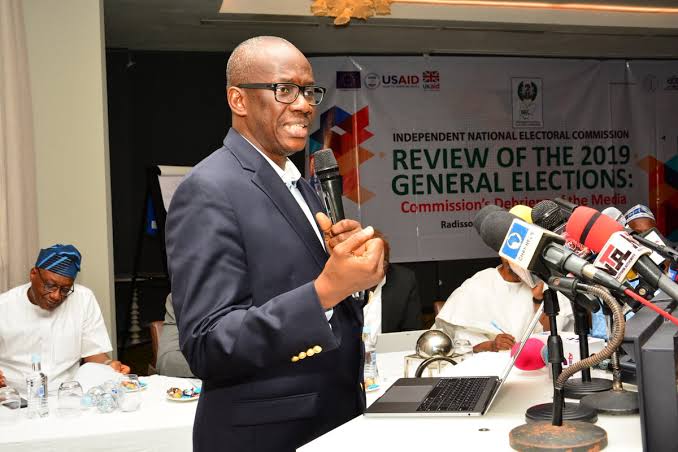The Independent National Electoral Commission (INEC) has stated that it is committed to conducting credible area council elections in the Federal Capital Territory (FCT) by February 12, 2022, using appropriate technology and innovative tools.
Mr Rotimi Oyekanmi, Chief Press Secretary to INEC Chairman, stated this on Monday in Abuja while speaking at the ongoing INEC FCT Election Monitoring and Support Centre (EMSC) Amber Zone Implementer’s workshop.
According to Oyekanmi, the technology deployment and innovative tools will focus on election monitoring and support systems.
He stated that the EMSC and the commission’s newly introduced Bimodal Voter Accreditation System (BVAS) will be critical in ensuring success in the upcoming elections in the FCT’s six area councils.
While the BVAS was implemented to improve the credibility of elections in the country, he stated that the EMSC assists the commission in identifying and mitigating potential risks in the conduct of an election in the country.
He named the Election Management System (EMS), Electoral Risk Management (ERM), and Election Operations Support Centre as the commission’s election monitoring components (EOSC).
“The Electoral Monitoring and Supervision Commission (EMSC) has evolved into a critical tool in the monitoring, implementation, and management of Nigeria’s electoral plans and activities.”
“The EMSC provides the commission with the information it needs to make real-time interventions to avert or mitigate potential risks or threats to an election,” Oyekanmi said.
In his presentation, titled “communication strategy,” Oyekanmi stated that communication was critical to the EMSC’s operations, thus the need for an appropriate strategy that ties together the personnel involved in the EMSC’s operational structure.
“The EMSC Communication Strategy aims to improve the effective and timely dissemination of information.”
He also reiterated INEC’s commitment to addressing some of the glitches discovered with BIVAS during the Anambra governorship election prior to the FCT poll.
In his remarks, Mr Hamza Fassi-Fihr, Project Coordinator, European Centre for Election Support (ECES), described the workshop as an important step toward the conduct of transparent and credible area council elections in the nation’s capital city.
Fassi-Fihr stated that the FCT election was critical because it was the first election after the Anambra Governorship election in which the BVAS was deployed on a large scale, following the Isoko by-election in Delta State.
“We know that the system worked well overall, despite the glitches and technical issues, whether related to the software or the handling of the device by ad hoc staff or voters.”
“In this context, the FCT Area Council election will be an important step forward for the Commission because it will have the opportunity to demonstrate the functionality of the BVAS, increasing its acceptability among stakeholders and at a very strategic time, one year before the general election,” Fassi-Fihr said.
According to the project coordinator, the center expects the FCT Area council election to set the standard for future elections, particularly election monitoring.
“It is critical to the successful conduct of the election to monitor the Commission’s level of readiness across the various electoral operations, as well as the pace of implementation through the EMSC.”
“The EMSC assists the commission in maintaining a real-time view of the electoral process and adapting to changing conditions on the ground.”
“This workshop is therefore critical because it will allow for the sharing of information on what has been done thus far, where you stand, and what needs to be done.”
“I am confident that the EMSC tool will play its role once more, as it did in the 2019 General Election and other off-cycle governorship elections,” Fassi-Fihr said.
